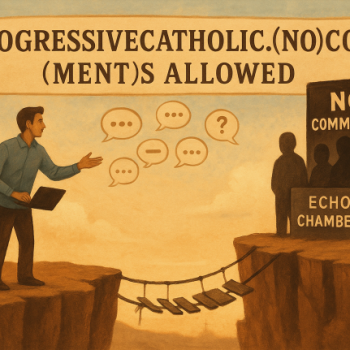You’d think the answer to the issue of the clash between religious freedom and equal treatment, when it comes to services related to gay weddings, would be easy to solve: allow people to claim religious exemption from providing services for gay weddings or commitment ceremonies, so long as this doesn’t hinder the ability of same-sex brides/grooms to find providers in their local area. If you’re one of many florists in town, then your rejection of floral arrangements for a gay wedding doesn’t cause any meaningful harm for the couple; if you have a monopoly on flower-arranging in your part of the state, then it’s a different story.
Seems reasonable, doesn’t it?
But the reality is that the so-called “marriage equality” crowd won’t sign on to this compromise.
Ross Douthat, in his column for the New York Times, poses the question (phrased as multiple questions): should any accommodation be made for those who believe that same-sex marriage is a sin, or, at any rate, not a true marriage as ordained by God? Or should measures be taken to compel the acceptance of SSM by all, up to and including removal of tax-exemption for churches which don’t perform these ceremonies? Unfortunately, he only received 8 comments, so his column doesn’t really offer a read of the pulse of NYT readers on the topic.
Here’s another NYT columnist, David Brooks, calling more vaguely for everyone to be nice to each other:
if there is no attempt to balance religious liberty and civil rights, the cause of gay rights will be associated with coercion, not liberation. Some people have lost their jobs for expressing opposition to gay marriage. There are too many stories like the Oregon bakery that may have to pay a $150,000 fine because it preferred not to bake a wedding cake for a same-sex ceremony. A movement that stands for tolerance does not want to be on the side of a government that compels a photographer who is an evangelical Christian to shoot a same-sex wedding that he would rather avoid.
Comments include the accusation that “the law, as it was written for Indiana, is but a hair’s breadth away from the Nuremberg Laws of 1935.”
Here’s The Atlantic, on the Indiana law: fundamentally, they say, what has them upset about the law is that it expands religious freedom protections to for-profit entities (e.g., florists, photographers) and it has wording in there that would enable it to apply to situations where an individual is suing another with respect to refusal to provide services. (Side note: apparently the RFRA laws as constructed in most states don’t provide protection against nondiscrimination laws; for instance, the case of the wedding photographer in New Mexico, there was a RFRA law on the books that the judge deemed inapplicable.) Now, there are 10,000+ comments on this article, which means that you’ll have to just trust me that the portion of the comments I read the other day consisted of commenters asserting that, indeed, if a Christian is unwilling to provide wedding services to gay people, they should be put out of business — and I’ve read plenty of similar comments in the past, on other articles on the topic. What’s more, in at least one case, the New Mexico wedding photographer, the couple was acting as “testers” specifically to identify whether she was willing to photograph a lesbian ceremony; it was unrelated to their ability to find a provider.
I had written previously that providing services for gay marriages is quite different than the discrimination that blacks faced historically: the key differences being that, in the latter case, discrimination was so widespread and so clearly affected the ability of blacks to reach economic and social equality with whites, and that, in the former case, the opposition to gay marriage is connected to a wider religious belief about marriage, not simply animosity towards gays and lesbians.
But it is clear to me after an accumulation of reading that “marriage equality” activists see these situations as identical, and believe that traditional Christians have no more right to oppose gay marriage, or same-sex relationships in general, than racists have to oppose equal treatment of blacks. Not a legal right, and not a moral right, and they deserve to be put out of business, fired, and, in any case shamed as not fit for decent society.
And so far, they seem to be getting their way, so much so that Indiana’s Mike Pence is now hurridly rushing in to announce, after announcements of boycotts, that, no, nothing in this law will protect businesses from being compelled to provide services for gay weddings, and they’ll amend it to be sure that’s the case.
What’s more, activists are now announcing that the Indiana law will allow businesses of all kinds to refuse to serve gays; for instance, The New Republic (which makes the disingenuous argument that wedding-service providers are protected by the First Amendment, ignoring court cases that have ruled against them). It’s hard to believe that they actually think so, and much more believable that they’re using any means necessary in their fight.
So what do you do?
Thinking about this some more:
I don’t have an answer. All I can offer is this: if we, those of us who believe that marriage is a sacrament and fundamentally about providing a mother, a father, and a stable environment for children, want to have any hope of preserving that belief, we have to understand that activists for gay marriage believe, and have persuaded much of society to believe, that opposition to them is equivalent, legally and morally, to racism. That’s the mindset we’re up against.
UPDATE:
Tolerance? eh, not so much. A pizza restaurant in Indiana, featured on the news yesterday as saying that, yes, hypothetically, they would not cater for a gay marriage, is now the subject of, at last count, 600 one-star reviews on yelp, some of them quite vulgar.















